After running two of Southeast Asia’s most famous bars in Saigon and Bangkok, New Yorker David Jacobson is feeling at home in his latest venture, Smalls, where jazz and good conversation meet in perfect harmony. Maxmilian Wechsler reports on Bangkok’s first speakeasy
| IF you haven’t been around Soi Suan Phlu in Yannawa district lately, you might be surprised at the thriving entertainment scene. Longtime expats will remember the old Immigration Department's main office and little else to justify a trip to this corner of Bangkok, daytime or nighttime. In recent years a slew of bars and restaurants have sprung up to give the neighbourhood a new vibe. On a recent Wednesday around 9pm, Smalls bar and restaurant on the corner of Soi 1 was hands-down the main attraction. In contrast to the subdued atmosphere at surrounding establishments, two of Smalls’ three floors were already packed, and more guests were entering through the unique revolving front doors. Smalls stands in even more of a contrast to the nearby Thungmahamek police station and the building that still serves as Immigration Bureau headquarters, though most operations have moved to Chaeng Wattana. The BigChilli was at Smalls to interview its American proprietor, David Jacobson, who also founded the famous Q Bar nightclubs. David opened the original Q Bar in Ho Chi Minh City (formerly Saigon) in 1992 and the Q Bar on Sukhumvit Soi 11 in 1999. When the jazz band started to play downstairs at 9.30pm, a regular event every Wednesday at Smalls, it was a pleasant surprise to be able to continue the interview without shouting. That’s intentional, David explained, calling the place a “conversation bar”. Meeting him for the first time was a positive experience. David is genuinely friendly, highly knowledgeable and interesting to talk to. With no attempt at flattery, it can be said that he looks much younger than his 70 years. His daily routine revolves around Smalls. He’s usually there from 10pm until past closing, and home and in bed between 4-5am in his lovely house on a quiet soi off Sukhumvit. |
| Son of immigrants David was born in New York City in January 1947. His father was born to immigrants who came to the US from Germany, and his mother’s family came from England. David was a commercial photographer by profession. “I did a lot of work in Los Angeles for studios and celebrities and had a lot of advertising jobs. I went to Vietnam for the first time in 1990 on a photo assignment, photographing health care for children for the World Health Organization. At the time there was little in Vietnam. There were maybe 20 new cars in the whole of Saigon, and there were hardly any foreigners except some Russians who financed the oil industry. It was a dead city. “I went back a year later, in 1991, and everything was changing because the government’s policy of ‘Doi Moi’ that allowed the Vietnamese to own businesses, was kicking in. Investment started pouring in from all over the world. The Russians left, and the Taiwanese, Singaporeans, French and others came back because Vietnam was a big market with a population of 95 million people. “I saw what was happening and I thought, ‘Man, this is going to be a boom town. I should be here because this is where the money is going to be made.’ But I was a photographer, and there was no Leo Burnett or Saatchi & Saatchi advertising agencies open yet in Vietnam. So I went back to the US. “I wondered how I could stay in Vietnam without being qualified to do anything. All these businesses were coming in to make money, to pan for gold. So I needed to sell the pans, in other words, something they all needed. Well, there was not one good bar in the whole city. So I was thinking, ‘We all need a drink sometime. When they sign a deal, they will celebrate. Six months later when the deals go bad, they are going to want a drink. It might as well be in my bar.’ “I had friends in California in the bar business, and I asked them to tell me everything I would need to open a bar. Bar 101. They showed me what to do, and I packed as much stuff as I could and went back to Saigon. “It took me four months to find the best location in the city. It was a People’s Committee building, the national theatre was upstairs, but the street level was available. There was a failing restaurant there. I thought this was a perfect place. Actually, nobody wanted it because they thought there were ghosts there as it was a 1900 French colonial. I don’t believe in ghosts and decided to take it. | “My girlfriend at that time was Vietnamese, from Pasadena, California. She still had relatives in Saigon, and we were able to rent the place through them. I sold all my cameras so that I could build the bar. I stripped it bare and started building. I slept in the bar for months to prove to my staff there were no ghosts. We opened Q Bar in 1992, with the best location in the city and the best drinks. “I spent almost every penny I had getting it ready to open. On the day we opened, I had just US$300 left. I didn’t even have money to advertise. But I wasn’t nervous. I really wasn’t, because I was sure that the city needed a bar. “Sure enough, it became a hit right away, the only place to go in the city. Famous people came in, like Robert De Niro with his son, and supermodel Kate Moss. John Fitzgerald Kennedy Junior was there with Daryl Hannah, and Norman Mailer came with his wife. Famous chefs from New York like Jean-Georges and eventually almost every diplomat in the city drank there. It became a celebrity hangout. All of a sudden I was on the cover of The New York Times Sunday Magazine. “I was among the first Americans to have a business in Vietnam after the war. It was very successful. Even Garry Trudeau of Doonesbury, the political comic strip, featured about a week’s worth of episodes based on my bar. That put us in newspapers and magazines all around the world. The staff was great. They just couldn’t understand why the bar was so famous and why all those famous people were coming in all the time. The government couldn’t understand the bar’s popularity because, to them, a bar meant karaoke and bad girls. There was none of that in my bar.” The notoriety proved to be a double-edged sword, however. “After I was in the country for almost seven years, they wouldn’t renew my visa. Of course, I wanted to know why. I pointed out that I was very good for the country. The bar was famous, in every guidebook, and we employed a lot of Vietnamese. Everybody who was important in the city drank there. Their answer was, ‘We don’t have to tell you why’. “People at the airport used to tell me, ‘Oh, they think you are CIA.’ I didn’t worry about it because I am not CIA. In those days, you couldn’t even have a fax machine in your house. They would read my faxes at the business centres and tap my phone. I knew I never had anything to worry about, but the Vietnamese authorities assumed there was something going on. Their thinking was: ‘Who owns that bar? An American photographer. Who is he working for? [I was, for a very short time, working for The New York Times.] He must be CIA.’ They never said that to me, but from many conversations I had later with various intelligence officers, it is possible that they really did think I was CIA.” |
| Opening Q Bar in Bangkok Basically barred from Vietnam, David decided to try his luck in Thailand. “I met my wife in 1998, a year before I came here. She was very brave. She decided to give up her life in Vietnam and move with me here to Thailand. It wasn’t easy because she had never been outside Vietnam. “At first I thought that I would be able to get back in Vietnam. I thought it was about money. I tried for months to get a visa but I couldn’t. I finally realised I might never get back in and I might have to start over. The money I made from the bar in Vietnam I used it to open Q Bar here. “I wanted to call the new place Q Bar too because a lot of people knew the name already. I opened Q Bar on Sukhumvit Soi 11 in 1999. I chose that Soi because the rent was cheap, there was good access from Sukhumvit and Soi 3 and the green route, and there was a parking lot across the street. It was a great deal. Right away the club did really well. It was an award-winning nightclub and a city favourite for years. “It was the first nightclub to bring in international DJs and the first to play hip-hop. Nobody was playing hip-hop music in Thailand. We brought in Jazzy Jeff, DJ Premier, Ice T and tons of other great DJs. We became very famous very quickly. “Eventually we redesigned the place. Business stayed great, the landlady was very nice, and my rent stayed cheap for almost 11 years. Then a new owner came in and raised my rent something like 600 percent. By that point, things had changed on Soi 11. It had become very popular with expats. More and more working girls and drug dealers were around. The crowd at the bar was changing too; we were getting a little bit of everybody. We were still making money, but I didn’t enjoy it anymore. Then too, Q Bar was getting expensive to operate, what with the increase in rent and maintaining a large staff. And I was getting older. I really was not enjoying club life anymore. I decided I had had enough and I sold the bar.” | Smalls – my latest venture “After I sold Q Bar I was going to retire. But at 10.30pm I had nobody to talk to except my wife. I have always enjoyed meeting new people, and you never know who you are going to meet at a bar. You meet intellectuals, musicians, filmmakers, writers and all kind of people. Frenchman, Bruno Tanquerel, a designer and artist who did design work for me at Q Bar, that I loved asked me to join him and open a bar at this place he had a lease on. I saw the place and liked it, and we got together and opened this neighbourhood bar three and a half years ago.” From the start, Smalls was intended to be a venue for good music, especially jazz. “The originals Smalls is a jazz club in New York. I went there when I was very young. Another Smalls was opened in Los Angeles by a friend of the New York owner. It was in a bad neighbourhood but it was very popular. I used to go there a lot. The guy who opened the place – it was his first bar ‒ became the most successful bar owner in LA, and now he is probably one of the biggest players in New York. He owns hotels, restaurants, and you name it. He is like my hero in the business. He always did what he thought. “Once a week we bring the most avant-garde jazz musicians in Bangkok to the club. It’s not the ‘hotel jazz’ you hear at most other clubs. It is a much more cutting-edge jazz. The rest of the week we have DJs who play a very eclectic mix. They spin just about anything except pop music – Afro, jazz, show music, everything mixed in together. It is very creative, but it’s not really dance music. Our DJs are both locals and foreigners. “As for customers, we get Thais and farangs, young and old, gay and straight. They’re an eclectic mix too. People from the neighbourhood come in, but we draw from all over. We do hospitality nights at Smalls and many of Bangkok’s top chefs, owners and bartenders hang here. We get an international crowd because this is an adult bar and a conversation bar. It’s not a dance club. There aren’t enough conversation bars in Bangkok, and the ones that are here are often in hotels, which tend to be boring by nature and also expensive. “Here you can get a good selection of food all night and a vast selection of alcohol for a good price. We have an excellent Head of Bar, Danny Yeung. He’s a Canadian-Chinese mixologist. Popular guy! We get a really diverse crowd, and that’s one thing I love about this bar. I never know who’s going to walk through the revolving doors.” |
Life in Bangkok
“As I said, my wife came here with me from Vietnam. We have a wonderful son. She comes to the bar basically once a month to make the great Vietnamese soup called pho. She has become famous in Bangkok for her soup. On the days she makes her pho we are fully booked on all three floors. Every seat”, said David. (Phuong’s Pho Night)
He remarked that Vietnamese and Thais are very different. “There’s nothing really in common rather than maybe appearance, somewhat. Both have a very beautiful Asian look, but the characters are quite different. The Vietnamese have a totally different background. For one thing, they were colonised. Vietnam has always been a warrior nation. Thousand of years of wars. As a result the Vietnamese are survivors, and they are industrious, I would say a little more so than Thais. Thailand has a more relaxed society.
“Still, I prefer to live and run a business here rather than in Vietnam. It has changed since I lived there. It was relatively easy to do business in Vietnam before, but now it’s quite difficult because there’s a lot more competition. Also, while Bangkok streets are noisy, streets in Saigon are even noisier. It drives me crazy. Another thing I like about Thailand is that it’s more developed. There are more options here than in Vietnam. It’s easy to find a good bookstore, movie theatre or restaurant. Overall, it is nice in Bangkok. I am a city boy and always have been. I tried living in the countryside long ago in the US state of Oregon, but it wasn’t for me.
“I am happy here. Running Smalls is a nice thing to do at this stage of my life. It’s not too demanding, not like running a big nightclub.
Back on the street around 11pm, Smalls appeared to be the only place doing much business on this Wednesday night other than the local 7-Eleven.
“As I said, my wife came here with me from Vietnam. We have a wonderful son. She comes to the bar basically once a month to make the great Vietnamese soup called pho. She has become famous in Bangkok for her soup. On the days she makes her pho we are fully booked on all three floors. Every seat”, said David. (Phuong’s Pho Night)
He remarked that Vietnamese and Thais are very different. “There’s nothing really in common rather than maybe appearance, somewhat. Both have a very beautiful Asian look, but the characters are quite different. The Vietnamese have a totally different background. For one thing, they were colonised. Vietnam has always been a warrior nation. Thousand of years of wars. As a result the Vietnamese are survivors, and they are industrious, I would say a little more so than Thais. Thailand has a more relaxed society.
“Still, I prefer to live and run a business here rather than in Vietnam. It has changed since I lived there. It was relatively easy to do business in Vietnam before, but now it’s quite difficult because there’s a lot more competition. Also, while Bangkok streets are noisy, streets in Saigon are even noisier. It drives me crazy. Another thing I like about Thailand is that it’s more developed. There are more options here than in Vietnam. It’s easy to find a good bookstore, movie theatre or restaurant. Overall, it is nice in Bangkok. I am a city boy and always have been. I tried living in the countryside long ago in the US state of Oregon, but it wasn’t for me.
“I am happy here. Running Smalls is a nice thing to do at this stage of my life. It’s not too demanding, not like running a big nightclub.
Back on the street around 11pm, Smalls appeared to be the only place doing much business on this Wednesday night other than the local 7-Eleven.

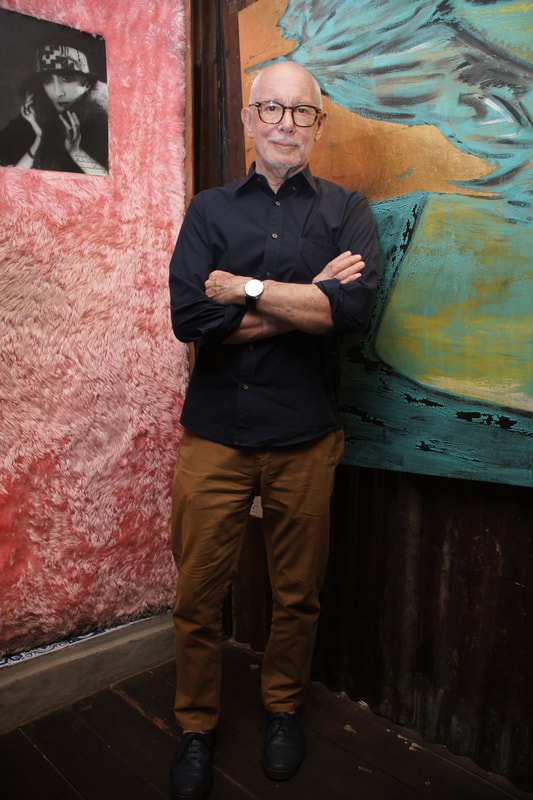
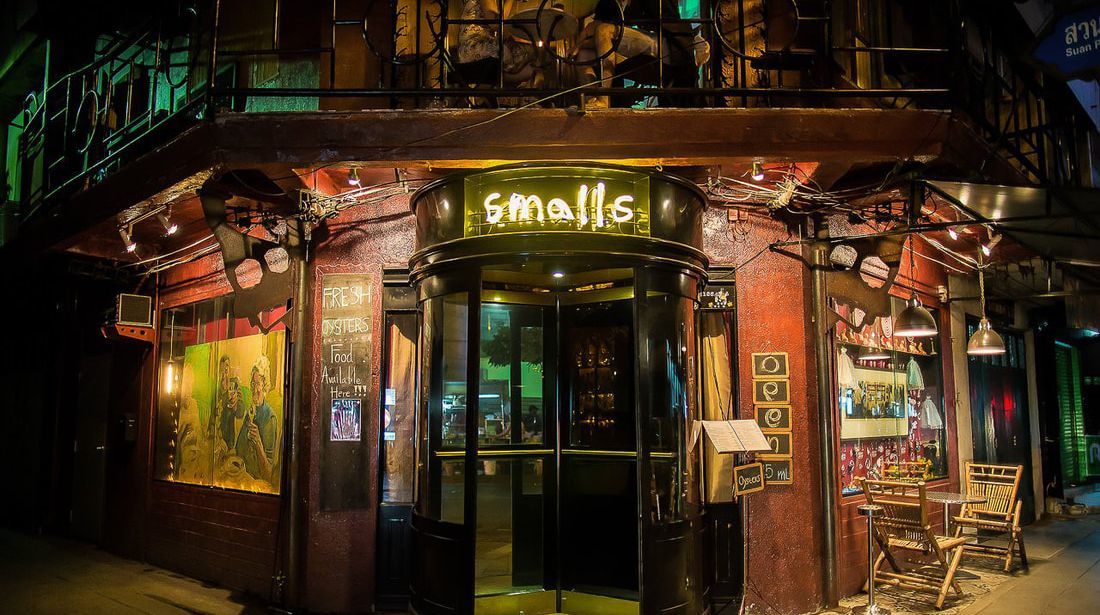
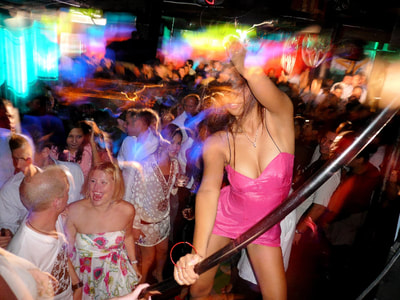
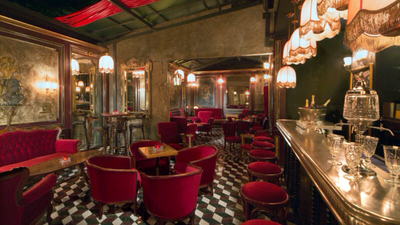
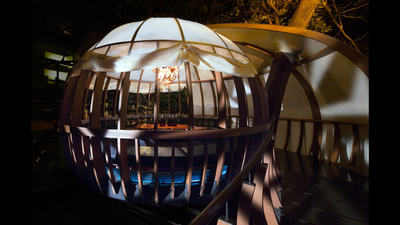
 RSS Feed
RSS Feed
















